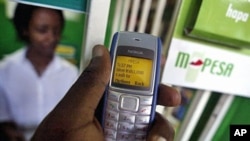During the past decade, mobile-phone technology has dramatically impacted the lives of poor communities in the developing world. Now, Kenya's main mobile service company has partnered with Equity Bank to launch a new kind of account that could help eradicate poverty through financial empowerment.
Last week Equity Bank and Kenya's largest mobile service provider, Safaricom, announced the M-KESHO account, which will allow Safaricom customers to deposit money into accounts with the bank, one of the country's largest financial institutions.
The M-KESHO account builds upon Safaricom's wildly successful M-PESA service, which allows Kenyans to store, withdraw and transfer money using mobile phones. Launched in 2007, M-PESA already has more than 10-million users and is providing many poor and rural Kenyans with access to financial services that were previously out of reach.
With M-PESA, customer's money can only be accessed through mobile technology. M-KESHO is a stepping stone for M-PESA customers into formal banking institutions. In addition to storing money with Equity Bank, M-KESHO customers will be eligible to earn interest on deposits and have access to microcredit, short terms loans.
Speaking at the launch, Safaricom CEO Michael Joseph emphasized the role M-KESHO could play in changing the financial lives of its customers.
"It allows our customers, many of them previously unbanked, to retain the features of M-PESA services while enjoying banking services: short-term loans, medical and personal insurance, accident insurance, availability of credit have also been built in," he explained. "But we cannot overemphasize the potential of this product to introduce a savings culture amongst Kenyan people," said Joseph.
Curiously, Kenya's underdevelopment has actually paved the way for the success of mobile banking.
Kenya's lack of telecommunications infrastructure allowed it to jump straight to mobile-phone technology in the past decade. Millions of Kenyans, many of them living in poor or rural communities, now own cell phones and have benefited from access to mobile technology. Now they could have access to long-awaited financial services.
The launch of M-KESHO comes just weeks after Nobel Laureate and microcredit pioneer Muhammad Yunus called for the international community to provide financial services to the poor at the 14th annual Africa Middle East Microcredit Summit in Nairobi.
"This is the time to redesign our financial architecture. And that architecture should be an inclusive architecture, not an architecture protective of the privileged and rejecting the rest of the world," said Yunus.
Yunus is the founder of the Bangladesh-based Grameen Bank, which provides small loans to the country's poor. The Nobel Laureate is well known around the world for his belief that financial services are a crucial part of development. According to Yunus, banking institutions can provide the world's poor with the ability to lift themselves out of poverty.
For a large segment of Kenyan society, opening accounts and taking out loans has proved impossible. Much of the population living in rural areas or city slums lacks the formal employment and credit rating necessary to apply for a loan or even an account.
More importantly, in a country with an average yearly income of around $1,600, the monetary threshold placed on such services have prevented an estimated 60 percent of Kenya's eligible population from opening bank accounts.
The M-KESHO accounts might now provide entrepreneurs in Kenya with startup capital for businesses as well as a financial record that could eventually open the door to more formal financial services.
The benefits do not end with loans. Company officials say mobile-banking technology allows customers to make payments remotely and securely. The technology can protect the earnings of Kenyans working in the informal sector.
The advent of mobile banking has also spawned new types of mobile service. Kenyan companies, including Equity Bank, are offering various types of micro-insurance to provide a safety net to customers often beset by instability. Micro-insurance accounts may also provide a lifeline to small and poor farmers who rely on often unstable environmental conditions to survive.









